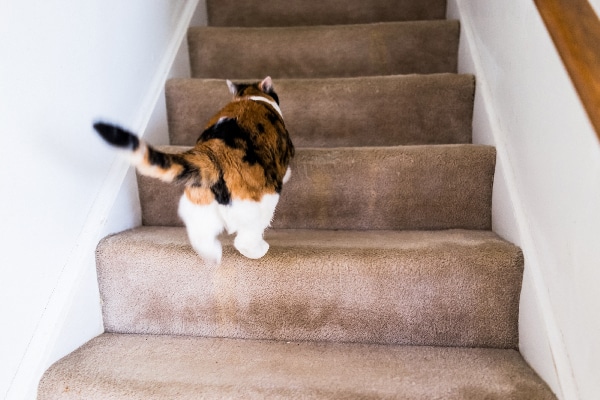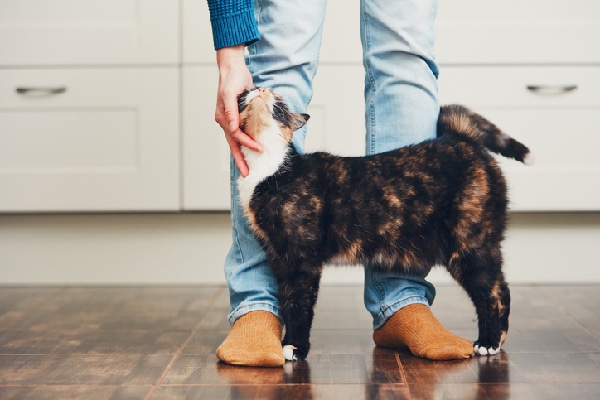Most times when I walk to the kitchen, my cat, Mimosa, decides to follow me. I’ve always put this down to the unflinching pursuit of food. Her treats are stored on the countertop, and her nightly wet food treat is served up in a bowl kept in a kitchen cupboard. It makes sense for Mimosa to chance her luck whenever I enter the kitchen. But it turns out there might be more reasons why a cat would follow a human around. If you’ve ever found yourself wondering, “Why do cats follow you?” here are some of the answers.

Ever wondered, “Why does my cat follow me?” You’re not the only kitty parent out there! Photography ©krblokhin | iStock / Getty Images Plus.
Why Does My Cat Follow Me? It Might Be a Kitten-Like Behavior
One of the answers to, “Why does my cat follow me?” is that a cat following you around might be learned behavior that stems from her kitten days. Despite the image of cats as highly independent creatures, young kittens learn about life by following their mothers. This is sometimes called the mother-kitten connection.
A kitten quickly learns that trailing her mother around will provide food, play, safety and affection — pretty much all the things a human ends up undertaking when they adopt a cat.
Jacqueline Munera, a Certified Cat Behavior Consultant at the International Association of Animal Behavior Consultants, builds on the point by adding that these sorts of positive interactions — which also include allogrooming activities like brushing and petting — help forge a bond between cats and their humans.
“Some cats are quite curious and want to keep tabs on what their human is doing,” Jacqueline adds. “Some cats just seem to enjoy hanging out with their humans and will follow them around different areas of the house. There can also be a darker side to this strong affiliative relationship in which cats actually suffer from distress when they are separated from their humans.”
So, the next time you find yourself asking, “Why does my cat follow me?” the first answer could be it’s a case of carrying out learned behavior.
Why Does My Cat Follow Me? Is It a Sign of Affection?
The second question after wondering, “Why does my cat follow me?” is to ask whether her habit of trailing you around is a form of cat affection.
“It is quite a compliment to be chosen as a favorite individual!” Jacqueline says. “It means that the cat chooses to be around you and spend her time in your sphere of activity.”
There might also be an element of your cat missing you going on — especially if you’re away from the house all day for work commitments. This can take the form of your cat following you around when you return and acting like she’s trying to instigate a play or petting session.
How Should You Reciprocate Your Cat Following You and Other Signs of Cat Affection?
It’s important to acknowledge and return the affection your cat shows when she follows you around — but make sure to do so in a way your cat appreciates.
“The best way to reciprocate depends on the individual cat’s preferences,” Jacqueline says. “Some cats may enjoy interactive playtime while others don’t really want interaction and just want to hang out near you.”
Related: Do Cats Get Lonely or Are They Fine Without Other Cats?
When reciprocating affection, it’s smart to experiment to see where your cat likes to be petted or brushed. “The areas that most cats prefer include under the chin, the cheeks and the top of the head,” Jacqueline says. “Some cats really enjoy scratches on their back near the base of the tail, and there are even a few cats that like belly rubs and scratches!”
“Owners can learn about cat body language so that they will be better able to understand their cat’s communication signals,” she adds.
Why Does a Stray Cat Follow You?
We may have answered the question,”Why does my cat follow me?” but what should you do if you notice what seems to be a stray cat following you outside?
Well, first of all, Jacqueline points out that if the feline is showing “signs of affiliative or friendly behavior” then it’s most likely “the cat is socialized to humans and is not feral.”
In most cases, the cat is a friendly indoor-outdoor cat taking advantage of her outdoor privileges. Feel free to pet the cat if she seems open to it — although do so softly and without startling her. And make sure you introduce yourself properly. (Also, wash and sanitize your hands afterward when you get home.)
If a cat continues to follow you outdoors, maybe she’s an indoor cat that’s lost. Check the cat for a collar or tags. Scan local listings or social media alerts to see if someone is searching for a cat with a similar description.
If the cat doesn’t seem friendly, Jacqueline recommends watching her body behavior to try and judge if the cat is acting in a threatening or scared manner. Although she adds, “This is generally not a very common problem because most feral cats leave humans alone.” Check to see if the cat’s ear has been tipped – the universal sign that a feral cat has been spayed/neutered. If not, consider getting the cat spayed/neutered through a local TNR program.
Top photograph ©Chalabala | iStock / Getty Images Plus.
